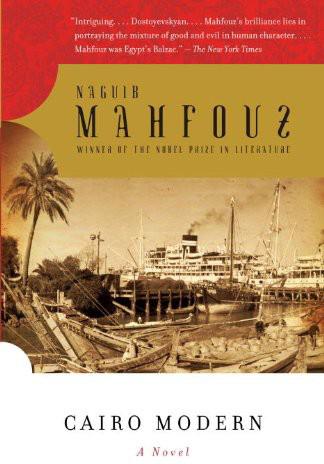
Cairo Modern
کتاب های مرتبط
- اطلاعات
- نقد و بررسی
- دیدگاه کاربران
نقد و بررسی

November 16, 2009
This new translation of an affecting early novel about love and social climbing by deceased Egyptian Nobel laureate Mahfouz (the Cairo trilogy) follows the fortunes of a Cairo university graduate eager to make his way in a venal 1930s imperialist society. When new graduate Mahgub Abd al-Da'im learns his father is at death's door and his monthly stipend will soon be terminated, he accepts a ministry position out of desperation. There is also a very large string attached: he must marry the minister's beautiful young mistress. The dishonor of this Faustian bargain is further underscored by the revelation that the young woman, Ihsan, was the ideal love of one of Mahgub's university friend's, and the two intended to marry before she was encouraged by her calculating family to accept the minister's seduction. Fallen characters, Mahgub and Ihsan set out on their single-minded path toward material advancement. Mahfouz is a master at depicting shifting forces of motivation, and despite some dated stereotypes, he offers a keen psychological portrait of a complex society in the midst of radical transformation.

December 15, 2009
An early work by the only Arab writer yet to receive the Nobel Prize in literature, "Cairo Modern" was originally published in 1945 and was first issued in English in 2008 by the American University in Cairo Press, in the same translation that appears here. His fifth novel overall and the second to be set in 20th-century Egypt, it captures Mahfouz in a fiery, youthful stage. Though largely a work of social realism, the story has strands of the existentialism that would figure heavily in Mahfouz's later novels. Mahfouz explores the lives of several recent university graduates in 1930s Cairo, particularly that of Mahgub, a poor but ambitious young man whose life spirals out of control as he fiercely pursues a place among the upper class. Throughout, Mahfouz displays a mastery of character development and strong control of his themes, mainly the consequences of trying to escape one's fate.
Also appearing in English this fall, "Before the Throne" (1983) offers a glimpse of a very different side of this author's prodigious talents. In this distinctive work, written largely in dramatic dialog, Mahfouz is concerned with understanding his country's identity through an exploration of its ancient history. The novel is set in a courtroom, with the sun god, Osiris, presiding. One by one, the great leaders of Egypt's past, beginning with King Menes of the First Dynasty, are summoned to defend their accomplishments and explain their faults. Osiris makes the final judgment and determines the fate of each leader's soul for eternity. Those granted immortality remain in the courtroom and may participate in subsequent trials, which leads to such unusual situations as Ramesses II confronting President Anwar el-Sadat. In the heated discussions that inevitably take place, Mahfouz shows how the defining ideals of a nation evolve. VERDICT "Cairo Modern" reads like a classic, gripping the reader from the first pages, a testament not only to Mahfouz but to translator Hutchins. Newcomers to Mahfouz may wish to start with this more accessible novel or other works like the "Cairo Trilogy" and "Midaq Alley". Despite its brevity and the experimental structure, "Before the Throne" is essential reading for anyone with a serious interest in Egyptian history or literature. It's a small gem.Forest Turner, Suffolk Cty. House of Correction Lib., Boston
Copyright 2009 Library Journal, LLC Used with permission.

























دیدگاه کاربران